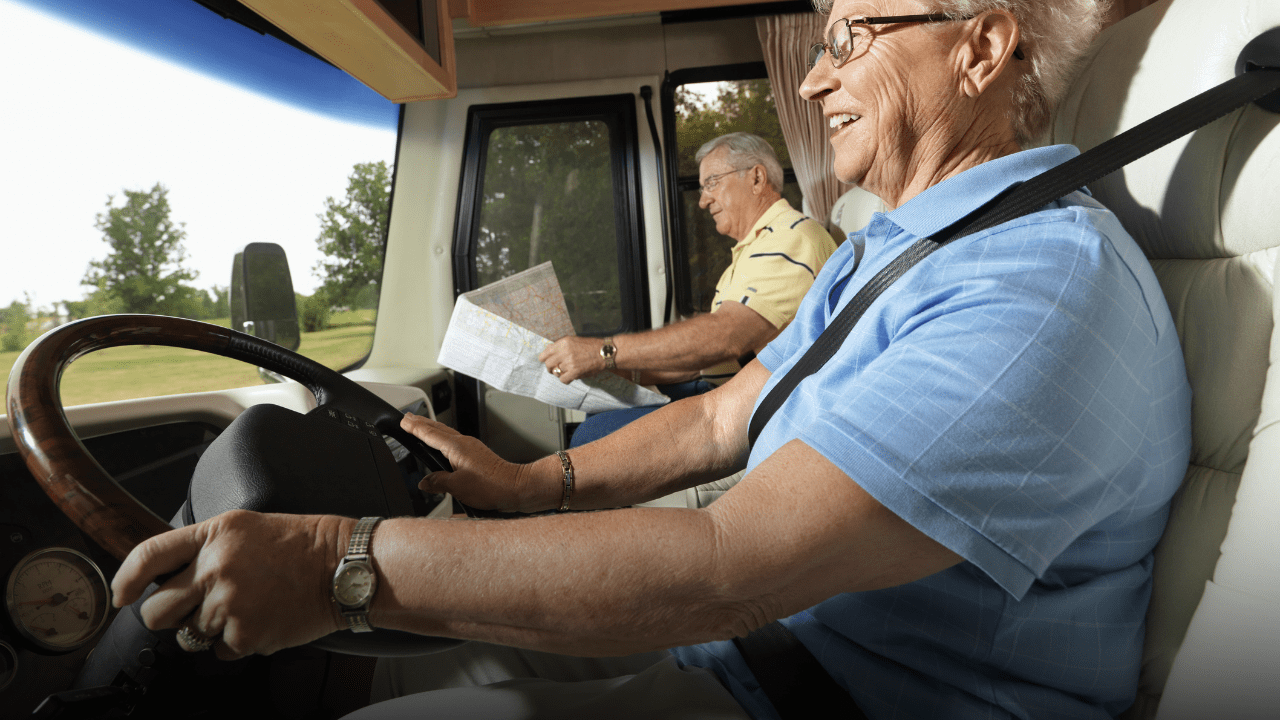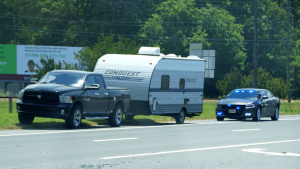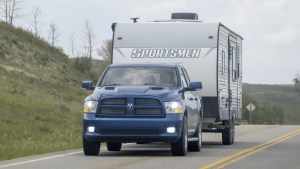Driving an RV isn’t the same as driving a car, and age can make those differences more noticeable.
Reaction times may slow, joints can stiffen, and vision changes can turn once-simple driving tasks into challenges. That doesn’t mean the keys need to be hung up; it just means driving habits should adapt.
With some smart adjustments to health routines, trip planning, and behind-the-wheel habits, older RV drivers can keep traveling safely and confidently.
How Aging Can Affect Driving Ability
Getting older doesn’t mean losing the ability to drive, but certain changes can influence how safe and comfortable it feels behind the wheel, especially in an RV:
- Stiffer joints and weaker muscles. Arthritis and reduced flexibility can make turning the wheel, twisting to check blind spots, or stepping on the pedals harder.
- Slower reaction time and reflexes. It may take longer to respond to sudden stops, changing traffic, or unexpected hazards.
- Vision changes. Night driving, glare from headlights or low sun, and reading road signs can become more challenging. Conditions such as cataracts, glaucoma, or macular degeneration may add to the difficulty.
- Hearing loss. Missing horns, sirens, or strange vehicle sounds can delay your response to emergencies or mechanical issues.
- Medication side effects. Drugs for sleep, pain, or other health conditions can cause drowsiness, lightheadedness, or slower reflexes.
- Cognitive decline. Memory or decision-making changes, including early dementia, can affect navigation and judgment on the road.
Recognizing these shifts early gives you the chance to adapt, adjusting how and when you drive rather than giving it up entirely.
How Older RV Drivers Can Stay Confident and Safe on the Road
The following tips focus on adjusting how you prepare, plan, and handle the road so you can continue to travel safely.
Vehicle Setup & Maintenance
- Get help with heavy maintenance tasks. If joint pain or reduced strength makes it hard to torque lug nuts, crawl under the RV, or handle heavy objects, schedule professional service rather than risking injury.
- Adjust seating for changing posture. With age, spinal flexibility can decline. Raise or lower the seat, adjust lumbar support, and tilt the steering wheel to keep a comfortable, upright driving position that doesn’t strain the neck or back.
- Extend visibility with specialized mirrors. Stiffer neck muscles and ageing eyes make blind spot checks more difficult. Install extended side mirrors or wide-angle add-ons so you can monitor lanes without twisting sharply.
- Upgrade to an easy-to-see backup camera. Reduced neck range and slower reaction time make cameras more valuable when maneuvering a long RV or trailer into tight spaces.
- Brighten and aim headlights correctly. Night vision often diminishes with age. Replace dim bulbs and adjust aim to improve low-light driving without blinding oncoming traffic.
- Keep glass spotless and reduce glare. Clean inside and outside surfaces regularly. Consider an anti-glare windshield treatment if night glare or halos around lights have become distracting.
Health & Physical Readiness
- Stay physically active year-round. Regular stretching and light strength training can help keep shoulders, neck, and core muscles flexible, making it easier to check blind spots, steer steadily, and handle long driving days.
- Address arthritis or joint pain early. Talk with your doctor if stiffness makes turning the wheel, pressing pedals, or twisting to look back uncomfortable. Adaptive controls, such as hand-operated brakes and gas pedals, can reduce strain.
- Schedule routine eye exams. After 60, get a dilated eye exam every one to two years. Night vision, depth perception, and glare sensitivity often change with age, and up-to-date prescriptions can help prevent missed signs or hazards.
- Protect against glare. If headlights or bright sunlight feel blinding, consider anti-glare or polarized glasses. Keeping your windshield spotless inside and out, as I mentioned above, also reduces halos and reflections.
- Keep hearing sharp. Have hearing tested at least every three years after 50. Missed sirens, horns, or unusual RV sounds can mean slower reactions in emergencies. Use hearing aids consistently if prescribed.
- Review medications with your doctor or pharmacist. Drugs for sleep, pain, blood pressure, or allergies can cause drowsiness or slower reflexes, even if labels don’t warn about driving. Adjusting timing or dosage may help.
- Skip driving when unwell or fatigued. Lightheadedness, stress, or poor sleep can reduce alertness. Older drivers may also need longer recovery after a long day on the road, so plan generous rest breaks.
Planning & Navigation
- Plan shorter travel days. Long hours behind the wheel can increase fatigue and stiffness, especially with age. Set realistic daily mileage goals and include extra time for breaks.
- Avoid driving at night if visibility is poor. Many older adults experience reduced night vision and more glare from headlights. Choose daylight hours whenever possible.
- Skip sunrise and sunset departures. Low-angle sunlight can create an almost unbearable glare and make it difficult to see road markings or approaching vehicles.
- Time trips to miss rush hour. Heavy traffic can mean sudden stops and quick lane changes, which are more challenging with slower reaction time.
- Choose familiar or low-stress routes. Stick to roads you know when possible, or plan routes with easier turns and moderate speeds instead of complicated highway interchanges.
- Avoid bad weather travel. Rain, ice, or snow can increase braking distance and reduce traction. Waiting for clear conditions may be safer than pushing through.
On-the-Road Habits
- Keep your speed moderate. Higher speeds mean longer stopping distances and less time to react, a bigger issue when reflexes aren’t as quick as they used to be.
- Leave extra following distance. Give yourself more room to brake smoothly and avoid sudden stops, especially with the added weight of an RV or tow vehicle.
- Brake early and gently. Start slowing down sooner than younger drivers might, helping to avoid abrupt, last-second stops.
- Limit distractions. Eating, texting, adjusting radios, or looking at maps while driving can be risky when reaction time is slower. Use voice-activated navigation or hands-free phone features if needed.
- Stay hydrated and stretch often. Dehydration and stiffness can lead to fatigue and slower reflexes. Stop every couple of hours to walk, stretch, and rest your eyes.
Skills Refresh & Support
- Take a driver safety refresher course. Programs like AARP’s Smart Driver or AAA’s RoadWise Driver can help you adjust to age-related changes and learn updated traffic rules that affect RVs.
- Get a professional driving evaluation. Driving rehabilitation specialists or occupational therapists can assess reaction time, vision use, and maneuvering skills in a large vehicle. They can also suggest adaptive equipment if needed.
- Ask family or friends for feedback. If passengers have noticed near misses, trouble parking, or uncertainty at intersections, it may be time to adjust your habits or seek additional training.
Experience is helpful, but safe RV driving changes as we age. Adapting to slower reaction times, managing vision and hearing changes, and choosing routes that feel comfortable can keep trips enjoyable and safer for everyone on the road. On top of that, regular health checks, thoughtful trip planning, and honest self-assessment go a long way toward preventing accidents. With the right adjustments, older RV drivers can stay confident on the road and continue traveling for years to come.
Additional Sources: National Institute on Aging. (n.d.). Safe driving for older adults. National Institutes of Health. Retrieved [10/1/2025], from https://www.nia.nih.gov/health/safety/safe-driving-older-adults







Write a comment